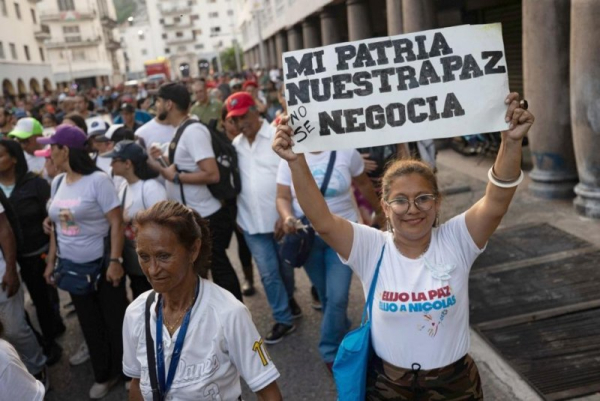Simple answers to tough problems are always wrong


Supporters of President Nicolas Maduro march against U.S. military deployment in the Caribbean Sea, which Washington says targets drug trafficking. Maduro claims the mission is a cover to remove him from power. Photo by Ronald Pena/EPA
Not only have Americans fallen prey to pursuing a seemingly simple answer to a complicated and complex problem, but they also have badly failed. Venezuela is the current poster child for this.
Wednesday is Guy Fawkes Day, celebrated in England with the memorable phrase, “Remember, remember the Fifth of November– Gunpowder, Treason and Plot.”
On that day in 1605, Guy Fawkes and others were arrested in the Gunpowder Plot to kill the Protestant King James I and blow up the House of Lords. That, of course, did not happen. And Nov. 5 has since been celebrated as “bonfire night.”
H.L. Mencken famously described this symptom. He wrote that, “For every complex problem, there is an answer that is clear, simple and wrong.” Too bad that truism is frequently ignored or forgotten.
Attempting to resolve a mutiny, and in the case of Fawkes, a regime change is neither simple nor easy. As the Trump administration tightens the noose around Venezuela and President Nicolas Maduro, is it falling into the simplicity trap of trying to resolve a multifaceted crisis with a single policy?
First off, why is President Donald Trump picking on Maduro? What could Maduro have done that was even more grievous than Vladimir Putin’s illegal and unprovoked invasion of Ukraine?
From the White House view, Maduro combines a number of bêtes noires and other reasons for this display of U.S. military force, and if Trump is to be believed, deployment of a covert CIA force.
Maduro encapsulates all the foreign policy devils taunting the president. The Venezuelan leader allegedly has cleaned out all the prisons and asylums and sent these inmates north to the United States to plunder, rape and kill Americans.
Maduro is also being assisted by Russia and China. To deny their presence, getting rid of Maduro makes sense. And, of course Venezuela is the strategic center of gravity for the drug trade that kills thousands of Americans each year.
The conclusion is clear. Get rid of Maduro and the Chinese-Russian assistance and drug problems are magically solved while ICE rounds up and deports the nefarious Venezuelan criminals and others.
This simplicity has a familiar ring. In 1961, President John F. Kennedy promised that the United States would “pay any price and bear any burden” in the defense of liberty and freedom.
Three and one-half years later, President Lyndon Johnson implemented that promise in defense of South Vietnam. After an alleged second North Vietnamese PT boat attack against two U.S. Navy destroyers in the Tonkin Gulf in early August 1964, Congress approved — with only two dissenting votes — the Tonkin Gulf Resolution that became a de facto declaration of war.
The Johnson administration believed that a series of air strikes would convince the North Vietnamese to cease and desist their activities in the south to overthrow the government.
This followed the assassination of President Ngo Dinh Diem on Nov. 2 1963, in a coup that brought a series of military juntas to power. Air power, with an increase in U.S. ground forces to support and train the South Vietnamese Army and eventually undertake military operations, was assumed sufficient to coerce Hanoi to capitulate.
It was a simple strategy that imploded and failed.
President George W. Bush likewise devised a simple answer to resolving the complexities of the Middle East. As Maduro is Trump’s target, Saddam Hussein was Bush’s. Whether the attempts to kill Bush senior made a difference, the younger came to believe that a “freedom agenda” would transform “the geopolitics of the region.”
Invading and democratizing Iraq would have a number of benefits. It would lead to the spread of democracy even to Saudi Arabia. Israel would therefore be permanently protected. And an invasion would eliminate once and for all Iraq’s programs for nuclear and chemical weapons.
While these weapons of mass destruction were the stated causes for the invasion — and National Security Adviser Condoleezza Rice said that we do “not want to wake up under a mushroom-shaped cloud” — WMD was merely a cover for the broader freedom agenda.
Trump will not invade. Using Tomahawk cruise missiles to attack land targets or Special and Covert Forces to kidnap Maduro and other leaders, while unlikely, cannot be ruled out. As LBJ believed bombing would force North Vietnam to capitulate, Trump is using similar reasoning to drive Maduro from office.
But will that stop the drug trade from Colombia, Mexico and elsewhere prevent Chinese and Russian intervention? Most unlikely.
Harlan Ullman is UPI’s Arnaud de Borchgrave Distinguished Columnist, senior adviser at Washington’s Atlantic Council, chairman of a private company and principal author of the doctrine of shock and awe. His next book, co-written with Field Marshal The Lord David Richards, former U.K. chief of defense and due out next year, is Who Thinks Best Wins: Preventing Strategic Catastrophe. The writer can be reached on X @harlankullman.